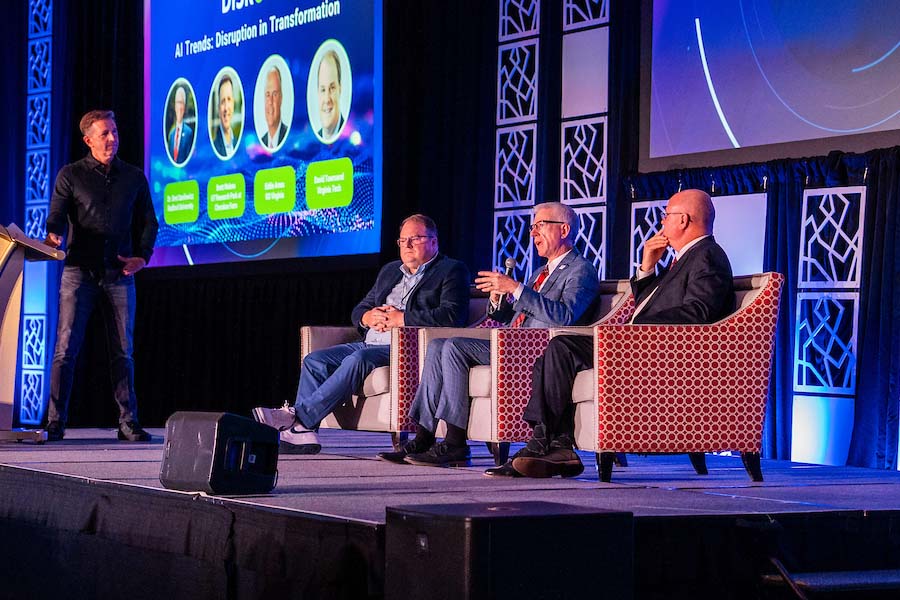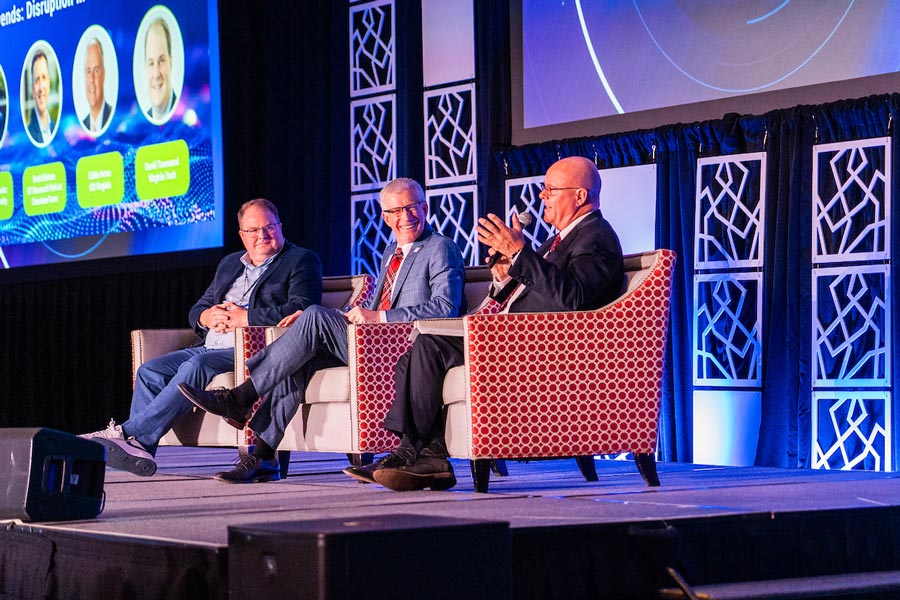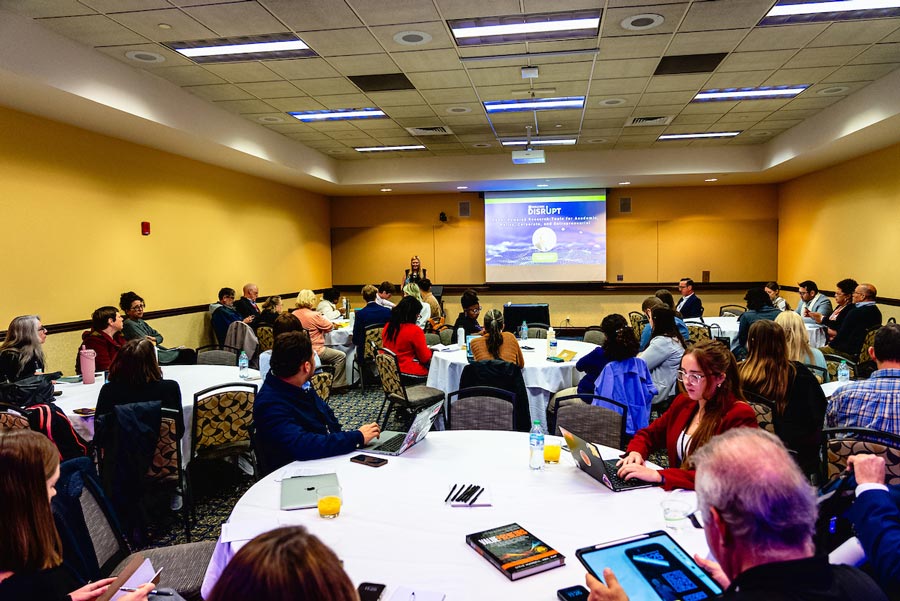Danilowicz joins AI discussion panel at Disrupt Up conference on emerging technology
by Neil Harvey
November 26, 2024

Artificial intelligence is a topic that, of late, obviously provokes a wide range of reactions.
Some people are extremely excited about potential uses for AI. Others approach its implications with anxiety and trepidation. And still countless more have no shortage of questions about what it is, what it does and how it will affect our futures.
Some short answers: AI is technology that’s capable of performing tasks that are typically associated with the human brain, such as visual and auditory perceptions, decision-making and interpretation of languages. A subset, called generative AI, is a deep-learning form of the medium – like ChatGPT, for example – that draws from vast amounts of data to produce new content by creating text, images, music and video.[HN1] [PM2]
Recently, the Disrupt Up Emerging Technology Conference, held at the Hotel Roanoke and Conference Center on Nov. 14-15, dove deeply into the phenomenon and what it could mean for the state, the nation and the planet as a whole.
About 200 guests and dozens of panelists, including Virginia Del. Michelle Maldanado (Manassas), took part in the presentations, breakout sessions and workshops, all sponsored by the Roanoke-Blacksburg Technology Council.
One of Disrupt Up’s first events was a morning roundtable discussion, “AI Trends: Disruption in Transformation,” featuring Radford University President Bret Danilowicz alongside David Townsend, the Schulze Professor of Entrepreneurship at Virginia Tech; William “Eddie” Amos, chairman of GO Virginia Region 2, and Brett Malone, CEO of the University of Tennessee Research Park at Cherokee Farm.
Malone, who moderated the chat, pointed to the opposing ends of the AI spectrum. On one extreme, he said, it can be used to produce junk email; conversely, however, he observed that surgeons treating children with cleft palates can now employ the technology to predict how their patients’ faces will mature as they age.
“They work backwards so the surgeon has a guide to be able to make the surgery more precise so that the future adult face has a more accurate look,” Malone explained. “That’s a transformational surgery for these children.
“You’ve got to look at both sides of this coin, and what I’m really excited about is where we’re headed for positive applications and how we can start to get smart about removing some of the negative connotations … and start to apply it in the right ways,” he said.
One of those paths runs through education.

Danilowicz noted that as a regional public university – one of just eight in Virginia – Radford is part of a system that produces 43% of the nation’s college graduates.
“We are continually innovating how we teach to try to develop the workforce,” he said, citing the fusion of students, research and technology through Radford’s Venture Lab, its Wicked Festival problem-solving event and its courses, one of which employs an AI-based virtual company that helps business students grasp complex elements like supply chains, marketing and customer service.
“It doesn't’t give them the answer,” Danilowicz said. “They have to learn how to use AI to further those business proposals. And the amazing thing with that is the students are learning both traditional hard skills and soft skills. So … by integrating AI, it's given these students a much more balanced perspective on how business works. It makes them really competitive.”
Townsend, too, spoke against the common notion that AI is capable of doing all the work for students, and he likened the technology to earlier generations’ use of electronic calculators.
“Should we allow students to have access to these tools?” he ventured. “I think that’s exactly the wrong question. They’re using the tools.”
The more precise decision, Townsend said, is “How do we better leverage those tools in an underlying model, an educational model? And so, I think in that particular space, it’s going to be enormous.
“Every issue is going to be touched by this.”
Indeed, if the fourth member of the panel, Amos, is proven correct, artificial intelligence will eventually scramble most current modes of employment.
“One of the things I found in my research recently … is a sobering aspect: 85 million jobs are going to be displaced by A.I. worldwide,” Amos said. “Now, on a bright note, there’s going to be 97 million new jobs created by A.I.”
“I look at this as the Industrial Revolution 2.0,” he continued, citing a recent article in which computer scientist Ray Kurzweil predicted that “the amount of innovation that you’ll see over the next five to 10 years will match what we’ve seen over the last 50 years.”
“So, think about that,” Amos concluded. “Change is coming.”
Other topics examined over the day-and-a-half that followed were the use of AI to automate businesses, the expanding field of biotech, security issues and a student roundtable, hosted by Carilion Clinic, called “Your Future in AI.”
Maldonado presented Friday’s opening lecture, “Policy with Purpose: Driving Virginia’s Innovative Future.”

Also among the breakout sessions was “GenAI Powered Research: Tools for Academic, Policy, Corporate and Entrepreneurial Leaders,” led by Samantha Steidle, director of Radford’s Venture Lab and Entrepreneurship Faculty. She gave a substantive overview of about 10 AI tools – ChatGPT, but also Perplexity, Research Rabbit, Consensus and Cite – and discussed their practical applications in a range of fields.
Using a tool called Gamma, she transformed a text-based document into a fully formatted and richly illustrated visual presentation within seconds, drawing audible reactions even from a tech-savvy crowd.
“It really is going to be the people that can use these platforms in the most responsible way that is going to move this forward,” Steidle said.
“There’s no putting it back in the bottle now,” she said. “Right now, the world needs entrepreneurs and innovators more than ever, and that is because we see opportunities in problems, and we have plenty of problems to work on.
“I think now is the time for all of us.”